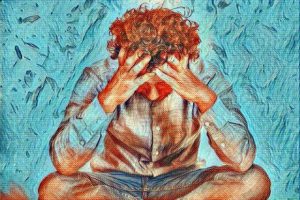In the rhythm of modern life, people ignore the symptoms of mental exhaustion, which affects physical condition, relationships with other people, and productivity. In this case, the physical condition affects the psychological one, too. Your body is a single system of interconnected processes and if one of the processes is disturbed, it leads to a problem in other systems. Therefore, if you want to be healthy and active at the age of love, pay attention to the state of your mental health and avoid mental exhaustion.

Mental health experts recommend you instill add some habits into your life that will help you maintain your mental health. Typically, these are practices of mindfulness, meditation, yoga, and sports. Also, you need to pay attention to your environment and determine what factors are causing your emotional exhaustion.
The first and important step on the path to mental health is the realization that you are psychologically exhausted. To do this, you need to see the symptoms of mental exhaustion in you, and then find a way to cope with them. Moreover, each person has their symptoms, which indicate that you need to pay attention to your health. We invite you to find out the most common of them, and if you see that you have several symptoms, then this is a signal that you need help.
Symptoms of mental exhaustion.
Emotional level:
- increased anxiety,
- emotional instability,
- irritability,
- depression,
- aggression,
- a lack of desire to live.
Physical layer:
- sleeplessness,
- chronic fatigue,
- persistent headaches,
- memory problems.
If you find that you are suffering from mental exhaustion, then you need to take steps to get your mental health back into good health. Therefore, you need to pay attention to your lifestyle and understand where you lose energy and health.

We offer you several recommendations on how you can improve your mental state and prevent its exhaustion.
Change the working mode. If you often stay after work, work at night, or take on additional work, then this is a path to mental exhaustion. You should change your work schedule and give up additional responsibilities. Reduce your workload and have more rest.
Food and sports.
Exercise is a great way to reduce stress levels and help relax your psyche. Even walking every day has a positive effect on your psychological well-being. Also, eating a balanced diet with adequate amounts of protein, fat, and carbohydrates helps your body produce essential hormones that support your nervous system. Refined sugar and foods that contain it takes away your energy and make you feel tired. Therefore, eliminate such foods from your diet or minimize their use.
Meditation.
Scientists have proven the effectiveness of meditation on the physical and mental state of a person. Through meditation, you learn to hear your body and emotions and can prevent your body from mental and physical exhaustion.
Medications.
In some cases, you cannot deal with exhaustion on your own. Therefore, you need to see a doctor who can determine the degree of your exhaustion and prescribe medication to eliminate negative symptoms. Note that the uncontrolled use of medications and antidepressants can cause your body to exhaustion.
The help of a psychotherapist.
If you cannot improve the situation with your mental state, despite all the steps taken, then you need psychological help. A psychotherapist will help you identify the cause of mental exhaustion and find solutions to the problem. Your doctor may recommend lifestyle changes that will fix your problems and improve your condition. People who suffer from depression and anxiety, with suspicious thoughts, especially need the help of a specialist. So don’t waste your time and see your doctor.
Comments are closed, but trackbacks and pingbacks are open.